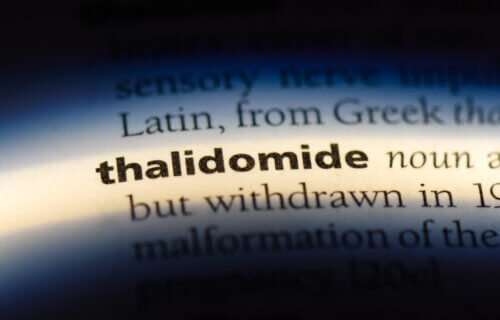VIENNA, Austria — The notorious drug thalidomide could finally find a useful purpose, preventing hemorrhages and strokes, according to new research.
Although the drug has an infamous history of causing birth defects decades ago, researchers say patients with diseased blood vessels benefited from using the medication. All 18 volunteers experienced dramatic reductions in symptoms and improvements in quality of life – with one enjoying a complete recovery.
The repurposed drug could revolutionize treatment of arteriovenous malformation (AVM), which affects more than three million people around the world. The genetic disorder causes swelling and disfigurement, and usually worsens over time.
“All the patients experienced a rapid reduction of pain, together with cessation of bleeding and the healing of ulcers where these were present,” says lead author Professor Miikka Vikkula of the Catholic University of Louvain in a media release. “The three patients with cardiac failure also saw their problems resolved, and one AVM appeared to be completely cured after 19 months of thalidomide and an eight-year follow-up.”
“We know that thalidomide acts through vascular endothelial growth factor (VEGF) a signaling protein that promotes the growth of new blood vessels,” Vikkula adds.
“VEGF levels are high in vascular abnormalities such as AVMs and is therefore likely that thalidomide reduces signaling via the angiogenesis-promoting pathways. Although our study is only small, the results are convincing, and we hope that they will be confirmed by larger trials.”
Thalidomide has a dark past
Thalidomide is one of the most controversial drugs ever produced. In the late 1950s and early 1960s, doctors gave it to pregnant women to combat morning sickness. However, their babies ended up being born without limbs. Scientists later found that the drug inhibits development of blood vessels in the womb, leading to a worldwide ban on the medication.
Those same properties, known as anti-angiogenesis, are now attracting interest in other fields. Two other drugs recently developed for use against cancer and being tested to treat AVM cost up to 12 times as much. They also have numerous side-effects.
“We had hypothesized that thalidomide should work in these patients, so our results did not come as a surprise, but it was great to have clinical confirmation that we were right,” Prof. Vikkula says. “In our view, this is a breakthrough finding and provides a solid basis for the development of molecular treatments for AVMs.”
Researchers presented the findings of the clinical trial annual conference of the European Society for Human Genetics in Vienna.
“Our group has been studying the causes of vascular abnormalities for 30 years,” the researcher continues. “We have identified several genetic causes and have been able to show that certain mutations activate the signaling inside the blood vessel wall -cells and this promotes the abnormal formation of blood vessels (angiogenesis). This led us to wonder about the possibility of using thalidomide to inhibit abnormal blood vessel formation.”
Does thalidomide cause any other side-effects?
The volunteers, all between the ages of 19 and 70, had severe malformations that could not be treated by conventional approaches. They had to agree to use contraception for at least four weeks before starting thalidomide and to continue for four weeks after the cessation of treatment. Since thalidomide is present in semen, men also had to agree to use condoms during sex.
Patients received either 50, 100, or 200mg doses per day for between two and 52 months. Eight cases were stable after average treatment cessation of four and a half years. Combined treatment with embolization, where arteries or veins within the AVM are blocked by an agent that destroys vascular wall cells, allowed the thalidomide dose to be reduced to 50mg per day in five patients.
Reducing the dose where possible was important because a higher dose led to side-effects, particularly tiredness, damage to nerves near the brain and spinal cord, and weakness and numbness in the hands and feet.
“This study shows not only the healthcare and economic benefits of repurposing drugs – even the most maligned – but also how genetic research can lead to real breakthroughs in therapies for difficult to treat, distressing conditions,” conference chair Prof. Alexandre Reymond says.
AVMs are abnormal tangles of vessels connecting arteries and veins that alter normal blood flow. They are very painful and cause bleeding and deformation of the affected body part as well as cardiac problems.
Usually congenital, they are often only noticeable during adolescence or adulthood as the person grows. Treatment of severe cases is usually through surgery or embolization. However, these deformed blood vessels can burst. About one in every 100 patients suffers a stroke each year. Doctors are now using thalidomide to treat leprosy and other skin conditions, as well as some cancers.
The results are also published in Nature Cardiovascular Research.
South West News Service writer Mark Waghorn contributed to this report.





This is amazing !! I hope one day this can be used to treat grade 4 &5 brain AVMs that are deemed inoperable Or untreatable.
Such a breakthrough!!!